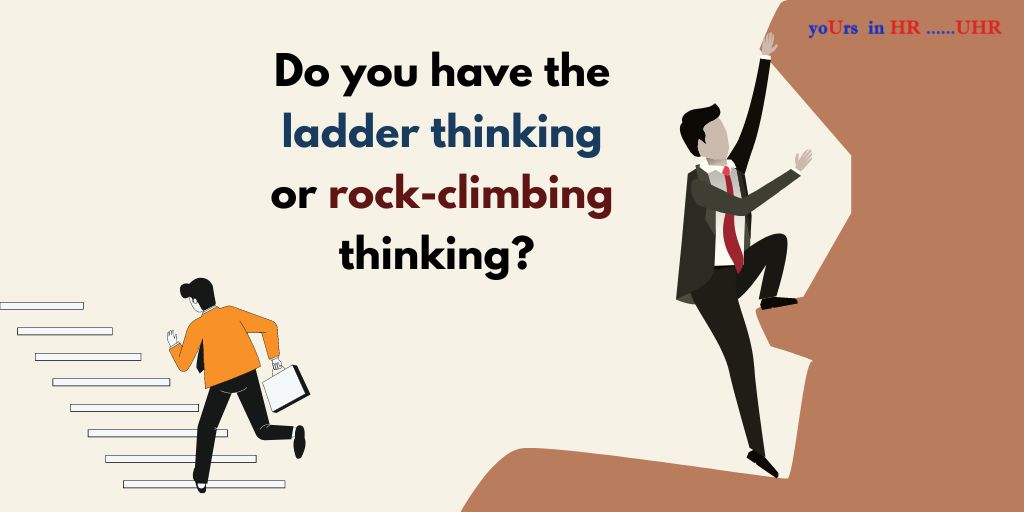
We have heard the age-old metaphor of climbing the ladder:
We take a step, and then we look for a step above. When we aim to climb the corporate ladder, we aim to take a career, rise up the ranks through L&D and promotions, one step at a time. A very easy looking ladder. Almost too easy, too simple. Actually, too simplistic.
What if we were to think of a more organic metaphor? Something a lot more realistic and less simplistic? How about the metaphor of rock-climbing?
We all must have seen visuals of climbers, with their harnesses and equipment, climbing over steep rocks and mountains. Or we might be familiar with those rock-climbing gymnasiums that offer a protected environment to develop our skills.
Rock-climbing, in any case, seems to be a more relatable and realistic metaphor that we should be applying to the concept of career growth. Let us delve into it.
Climbing requires us to be strong and competent enough. If we aren’t, we can slowly learn, through the support of ropes, harnesses and other equipment. Similarly, to be a competent employee requires that we have some skill-set that can support us. We learn. We start small- we don’t aim to reach the peak, when we know two feet above the ground is what will be a major achievement for us. Shadowing, internships, mentorship programmes, observing colleagues and seniors we admire, upskilling workshops could be the harnesses through which we learn in the corporate world. The more we practice, the more we learn, the stronger we get- in climbing and in our field. And the beauty of it is there is a possibility to get stronger.
When we are strong enough, it becomes easier to climb the most complicated surfaces.
Climbing is complicated indeed. Beginners will tell you how each step can be a challenge. Each little movement requires one to calculate the move, and at the same time, rely on one’s instincts. Climbing doesn’t simply involve going in an upward direction. Experienced climbers will tell you how there are times when we must ‘read’ the surface, and adjust our positions- spot the tiny but sturdy rock that offers support and saves you from a fall, or stretch ourselves just about right, consider the physics, and with one little pivot, climb a few feet at once. Systematically. Similarly, in the corporate world, we sometimes need to think about lateral growth. Perhaps as we can explore other departments. Through those ‘tiny rocks’ we might end up acquiring more skill-sets, finding our own hidden talents, which will eventually help us find our own niche.
And big rocks that appear sturdy and strong, might come loose as you step on them. Just as big companies might not always be as they appear- mass lay-offs, toxic competitiveness are only some ‘loose rocks’ we have heard of recently. You see, climbing isn’t simply about going up– it is also about going side-ways, maybe take a few steps down, make a diagonal move and then perhaps make a move that will finally take us to the next level. Just as exploring inter-departmental growth.
Growing in one’s career can be all about encountering challenges, and finding the best possible move at that point. The move might take us a few notches sideways, perhaps even seemingly down a few steps, but eventually, it is all progress.
A career can be a straight line for some people, of course- go study accounting, and become an accountant. Have an MBBS, finish your MD, a bunch of internships, residencies and finally become a doctor. But for so many of us, career growth involves some trial and error. Perhaps you started off with a science degree, but realised eventually that you find much more fulfilment in having your own business. Or you started off with a keen interest in journalism, only to realise later that a management job is where you thrive.
Like climbing, handling a career is about staying strong in the present, and still finding a way to move forward. It is about finding out that as skills, strength and competence develop, as we learn new things about us and our environment, there might be unexplored avenues for us that might surprise us.

